Description
The Moss-PAS (Diag ID) is semi-structured clinical interview with separate sets of questions for patients and informants. It is primarily designed for people who have enough language to give at least some verbal contribution to an interview, but can also be used as an informant-only interview. It has been developed from the well-known PAS-ADD 10 psychiatric interview and PAS-ADD Clinical Interview, but has been completely updated and re-designed on the basis of more than twenty five years’ experience of training users around the world.
The Moss-PAS (Diag ID) is probably the most sophisticated patient interview that is globally available for people with intellectual disability, and for those who have limited language skills. It is also suited to research studies, and for any routine clinical assessment requiring a precise evaluation of symptoms.
The interview produces criterion-by-criterion diagnoses under both ICD 11 and DSM-5. The score form has been designed to make it clear, not just the criteria that have been fulfilled, but also those that are close to it. This makes the process of clinical interpretation easier, and based on firm clear evidence.
Fully compliant with DSM-5 and ICD-11, Moss-PAS (Diag ID) covers:
- Agoraphobia
- Social phobia
- Specific phobia
- Panic disorder
- Generalized anxiety disorder
- Obsessive compulsive disorder
- Depressive episode
- Depressive episode with psychotic features
- Manic episode
- Manic episode with psychotic features
- Schizophrenia
- Schizoaffective disorder
- Other non-organic psychosis
- Other persistent delusional disorder
- Delusional disorder
- Psychosis unspecified
- Hyperkinetic disorder
- Autism Spectrum Disorder
- Delusional disorder
- Psychotic disorder NOS
- Brief psychotic disorder
- ADHD
- Autism
Moss-PAS (Diag ID) comes with 5 Interview Score forms. Order more Moss-PAS (Diag ID) Interview Score Forms here
The Moss Psychiatric Assessment Schedules
The Moss Psychiatric Assessment Schedules (MPAS) are the successors to the well known PASADD system. The original Psychiatric Assessment Schedule for Adults with Developmental Disabilities was developed to provide improved patient interviewing for adults with intellectual disability, and over the years the name became synonymous with mental health assessment in people with intellectual disability. Since those early days, the author has continued to develop new assessments, and to train several thousand people in their use round the world. The insight and feedback from these users has enabled ongoing refinement of the questions, and improvements in the descriptions of symptoms in various levels of severity. The result of this 30 years of development is a set of assessments of unparalleled quality and ease of use. The series now includes versions for adults and children, both with intellectual disability, and of normal developmental level. Coming soon will be an expert interview designed specifically for forensic use.
For full information about validity and reliability, together with sample pages to view or a digital version of this MPAS assessment tool please visit www.moss-pas.com.
Audience
All professionals involved in mental health assessments of people with learning disabilities.
Psychiatrists, clinical psychologists and mental health professionals
Authors
Dr Steve Moss and Dr Robin Friedlander
Dr Steve Moss has worked for 30 years in disability research, initially in the fields of children with visual impairment and children’s motor development, and subsequently in the areas of intellectual disability and mental health assessment.
His work on development of the PASADD system, now entitled Moss-PAS (Moss Psychiatric Assessment), is particularly well known, and these assessments are now used in many countries throughout the world.
Dr Moss has published over 80 articles, chapters, books and assessments, and has trained several thousand people around the work in use of the Moss-PAS (PAS-ADD) system.
He worked for 20 years at the Hester Adrian Research Centre, Manchester University, and later at the Institute of Psychiatry, King’s College London, where he continues to have an honorary post.


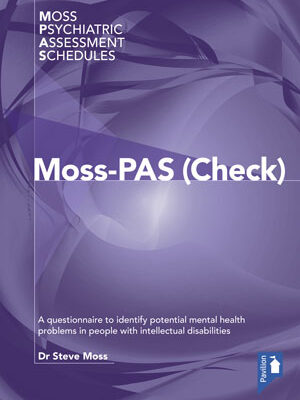
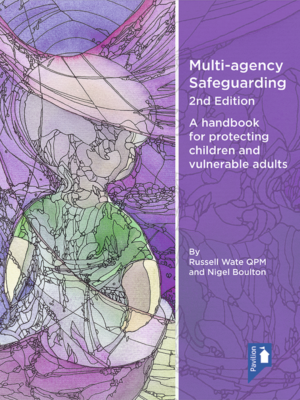
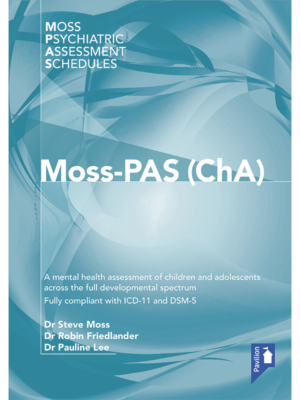
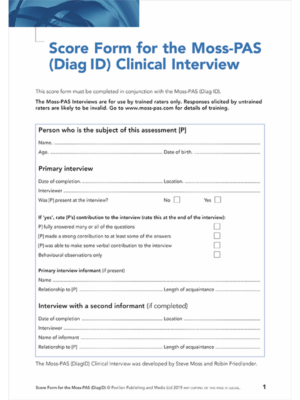
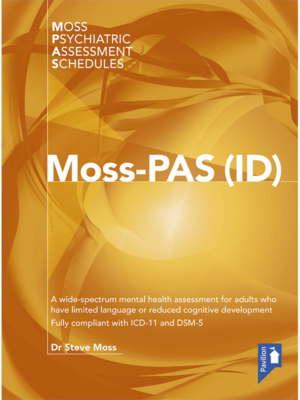
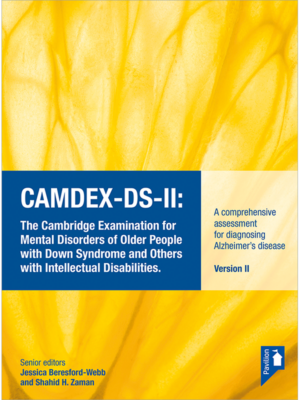
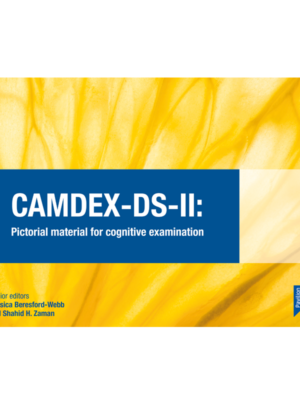
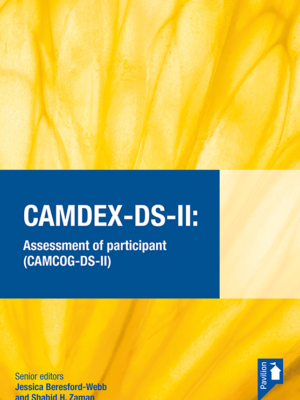
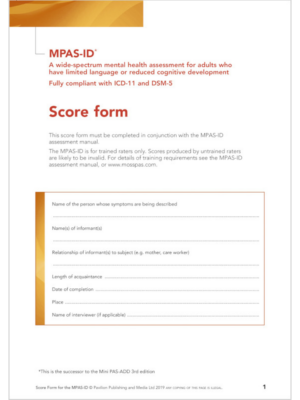
Reviews
There are no reviews yet.